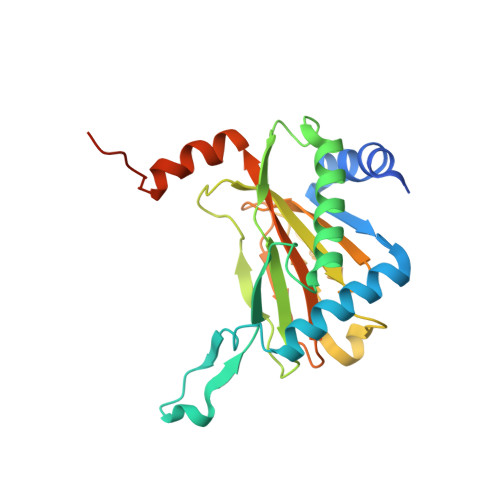Molecular and cellular mechanisms of HIF prolyl hydroxylase inhibitors in clinical trials.
Yeh, T.L., Leissing, T.M., Abboud, M.I., Thinnes, C.C., Atasoylu, O., Holt-Martyn, J.P., Zhang, D., Tumber, A., Lippl, K., Lohans, C.T., Leung, I.K.H., Morcrette, H., Clifton, I.J., Claridge, T.D.W., Kawamura, A., Flashman, E., Lu, X., Ratcliffe, P.J., Chowdhury, R., Pugh, C.W., Schofield, C.J.(2017) Chem Sci 8: 7651-7668
- PubMed: 29435217
- DOI: https://doi.org/10.1039/c7sc02103h
- Primary Citation of Related Structures:
5OP6, 5OP8, 5OPC, 5OX5, 5OX6 - PubMed Abstract:
Inhibition of the human 2-oxoglutarate (2OG) dependent hypoxia inducible factor (HIF) prolyl hydroxylases (human PHD1-3) causes upregulation of HIF, thus promoting erythropoiesis and is therefore of therapeutic interest. We describe cellular, biophysical, and biochemical studies comparing four PHD inhibitors currently in clinical trials for anaemia treatment, that describe their mechanisms of action, potency against isolated enzymes and in cells, and selectivities versus representatives of other human 2OG oxygenase subfamilies. The 'clinical' PHD inhibitors are potent inhibitors of PHD catalyzed hydroxylation of the HIF-α oxygen dependent degradation domains (ODDs), and selective against most, but not all, representatives of other human 2OG dependent dioxygenase subfamilies. Crystallographic and NMR studies provide insights into the different active site binding modes of the inhibitors. Cell-based results reveal the inhibitors have similar effects on the upregulation of HIF target genes, but differ in the kinetics of their effects and in extent of inhibition of hydroxylation of the N- and C-terminal ODDs; the latter differences correlate with the biophysical observations.
- Chemistry Research Laboratory , Department of Chemistry , University of Oxford , Oxford OX1 3TA , UK . Email: christopher.schofield@chem.ox.ac.uk.
Organizational Affiliation:




















